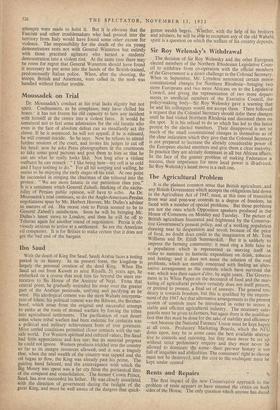Trieste—The Cause of the Riots The violent upsurge of bitterness
in Italy -against Britain seems to be subsiding, although it will be long before Anglo- Italian relations recover from the blows dealt in Trieste last week. Signor Pella's appeal for calm has been heeded; ,Sir Winston Churchill's temperate words at Guildhall have been well received; any further anti-British demonstrations would be frowned on in Italy; and it is pow agreed there that an international enquiry into the events which led up to the shoot- ing of six Italian demonstrators in Trieste last week would have a further soothing effect on public opinion. The sooner it is soothed the better, for those recent events have held up diplomatic negotiations for the conference to settle the Trieste question and enable the British and the Americans to relin- quish their most thankless task. Trieste itself is coming back to normal and more responsible Italians there are admitting that the riots now seem to have been anything but spontaneous and innocent in character. General Winterton has hinisele thrown sotne light on this by disclosing that he .had been informed by the Italian Government that there was likely to be trouble in Trieste on November 3rd and 4th, and asked whether he would use troops to keep order. It is still the official Italian view that the riots were set off by General Winterton's refusal to allow the Italian flag to be flown from the Town Hall and then by the confiscation of the flag when attempts were made to hoist it. But it is obvious that the Fascists and other troublemakers who had poured into the territory from Italy would have found some other excuse for violence. The responsibility for the death of the six young demonstrators rests not with General Winterton but entirely with those practised agitators who turned a students' demonstration into a violent riot. At the same time there may be room for regret that General Winterton should have found it necessary to put arms into the hands of the British-trained, predominantly Italian police. When, after the shooting, the troops, British and American, were called in, the mob was handled without further trouble.

































 Previous page
Previous page